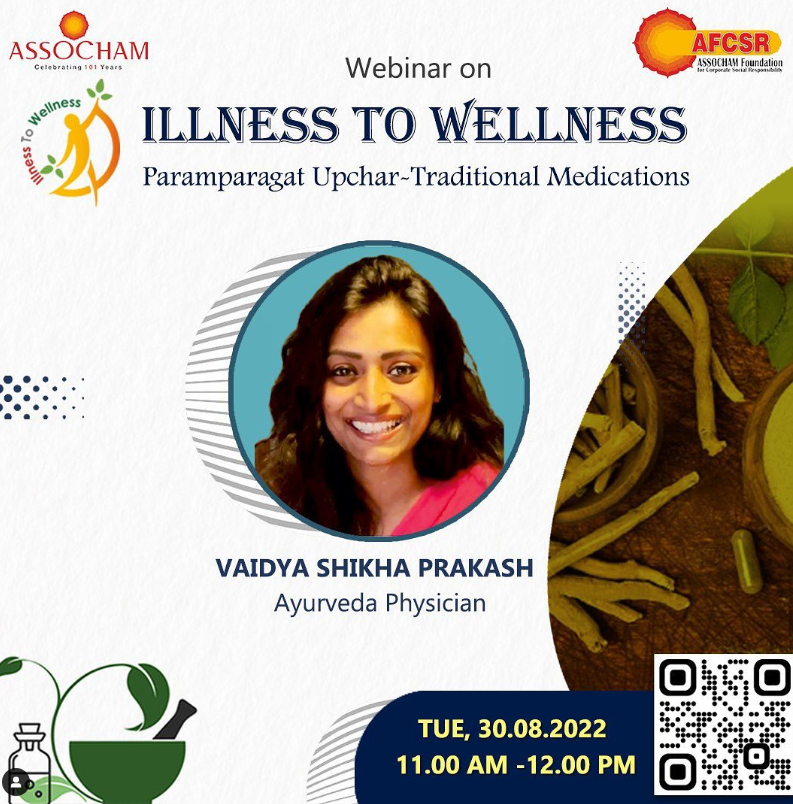ILLNESS TO WELLNESS Webinar on “Paramparagat Upchar” -Traditional Medications
The complete medical systems involve complete systems of practice and theory that which has further evolved independently from or parallel to allopathic (conventional) medicine. Many traditional systems of medicine that are being practiced by individual cultures throughout the various region of world. Major Eastern whole medical systems include traditional Chinese medicine (TCM), Kampo medicine (Japanese), and Ayurvedic medicine, one of India's oldest and traditional systems of medicine. Major Western whole medical systems include homeopathy and naturopathy. Other systems have been developed by American, African, Middle Eastern, Tibetan, and Central and South American cultures.
Ayurvedic Medicine
Ayurveda, which is known as "the science of life," is a one of the oldest natural healing system developed in India. Ayurvedic texts claim that the sages who developed India's original systems of meditation and yoga developed the foundations of this medical system. It is a comprehensive system of medicine that places equal emphasis on the body, mind, and spirit, and strives to restore the innate harmony of the individual. Some of the primary Ayurvedic treatments include diet, exercise, meditation, herbs, massage, exposure to sunlight, and controlled breathing. In India, Ayurvedic treatments have been developed for various diseases (e.g., diabetes, cardiovascular conditions, and neurological disorders).
Homeopathy
Homeopathy is a complete system of medical theory and practice. Its founder, German physician Samuel Christian Hahnemann (1755-1843), hypothesized that one can select therapies on the basis of how closely symptoms produced by a remedy match the symptoms of the patient's disease. He called this the "principle of similar." Hahnemann proceeded to give repeated doses of many common remedies to healthy volunteers and carefully record the symptoms they produced. This procedure is called a "proving" or, in modern homeopathy, a "human pathogenic trial." As a result of this experience, Hahnemann developed his treatments for sick patients by matching the symptoms produced by a drug to symptoms in sick patitents.Hahnemann emphasized from the beginning carefully examining all aspects of a person's health status, including emotional and mental states, and tiny idiosyncratic characteristics.
While the complete medical systems differ in their philosophical approaches to the prevention and treatment of diseases, they share a number of common elements. These systems are based on the belief that one's body has the power to heal itself. Healing often involves multiple techniques that involve the mind, body, and spirit. Treatment is often individualized and dependent on the presenting symptoms
With the paramount objective to cascade awareness and disseminate knowledge about healthy and balanced diet to lead a healthier, happier, and prosperous life, ASSOCHAM CSR Council, under ILLNESS TO WELLNESS campaign, organized a webinar on “Paramparagat Upchar” - Traditional Medications is scheduled on Tuesday, 30th August 2022, 11.00 AM To 12.00 PM
EMINENT SPEAKERS
- Dr Bhasker Sharma, Practicing Clinical Nutritionist, Columnist, Author, an Entrepreneur and Researcher
- Dr Kriti Soni, Head R&D Kapiva Ayurveda
- Vaidya Shikha Prakash, Ayurveda Physician
- Dr. Rajesh Kesari, Founder and Director Total Care Control, Delhi – NCR EC Member, RSSDI
- Shri Anil Rajput, Chairperson, ASSOCHAM CSR Council

